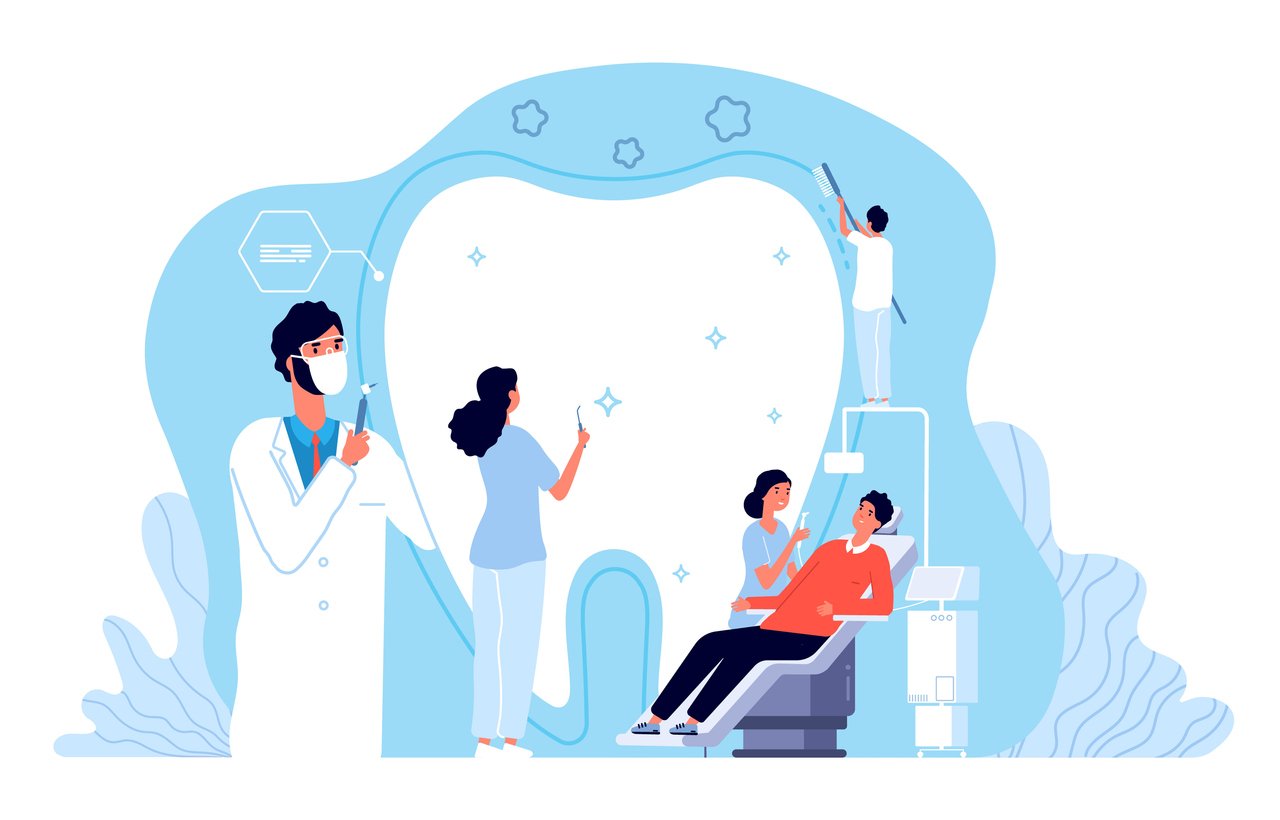June 2018--Selling dentistry can be an uncomfortable phrase for many health professionals. How to sell dental treatment plans ethically and effectively?
Janet Hagerman stopped by to talk with Amol Nirgudkar, CEO of Patient Prism, and to highlight some tips she uses to help practices sell treatment — with heads held high.
Table Of Contents
- Selling Dental Services Ethically, Elegantly, and Effectively
- Consider Finding a Dental Coach Who Will Follow Up
- Use Communication To Build Trust
- Improve Your Handoffs To Improve Trust
- Explain, Then Explain Again
- Meetings Make Money
- You’re Not a Dental Practice: You’re an Artist
Selling Dental Services Ethically, Elegantly, and Effectively
 There are good and bad ways to sell dentistry to your patients. Selling ethically means giving patients exactly what they need.
There are good and bad ways to sell dentistry to your patients. Selling ethically means giving patients exactly what they need.
You have to effectively communicate what is needed to patients not used to the industry vocabulary.
You can give your patient all this clinical information; for some reason, they just don’t get it, or they walk to the front and forget it.
The exciting part of selling is when the patient says, ‘Yes, I get it. I want it.’
They accept the treatment. They book the appointment. Everybody is happy. They don’t have buyer’s remorse. That’s the effective part of it.
Finally, there’s elegance when selling dentistry the right way. It means believing in your purpose.
All health professionals must feel really good about what we have to sell.
We live in a fantastic age of incredible dental technology to offer patients. There’s no reason not to feel so proud and excited about that. When that resonates with the patient, it also increases trust.
Consider Finding a Dental Coach Who Will Follow Up
When Hagerman consults with dental practices, she spends three days in the office.
- On the first day, she observes team-member communication
- The next day she conducts a workshop on the best ways to communicate with each other and with patients
- On her third day: seeing how well the team has implemented their learned skills
Whether you’re downloading information to your staff from a conference or using a coach, follow-up afterward is imperative for behaviors to change.
Dentists are incredible at acquiring knowledge.
But when they return to their offices and get back into the routine, what they have learned never gets implemented in practice.
Use Communication To Build Trust
 A coach can help you communicate with different types of people while building trust for your practice. You can’t use the same script for every patient. Building trust is a process.
A coach can help you communicate with different types of people while building trust for your practice. You can’t use the same script for every patient. Building trust is a process.
It's not what you say. It’s how you say it. It has to do with how we make people feel.
So many things we can do in dentistry that build trust don’t even have to do with spoken communication.
It may seem obvious, but team members need to stay away from criticizing and, instead, accelerate how much they praise each other.
Here’s an example:
“I gotta tell you, doctor so-and-so is fantastic. She gives the best shots. You never feel them. Doctor so-and-so is lovely. His work is so beautiful you’re going to love it.”
Improve Your Handoffs To Improve Trust
A good handoff includes an introduction to the following staff member they’ll see.
Communication about what’s been done with the patient and what treatment they’re now ready for, and a chat at the front desk asking the office manager to schedule the patient’s next appointment for a specific treatment.
It’s imperative that our patients never have to worry about what was the next step.
Explain, Then Explain Again
Just remember: repeat, repeat, repeat.
Patients don’t know the jargon and usually can’t retain most of what you communicate, so talk them through the steps as you go.
It’s like setting the stage for the next step or treatment. And really, all you’re doing is focusing on the patient. Increase your patient care, and you’ll increase your production. It’s just the way it works.
Meetings Make Money
 Many doctors say they don’t have time for meetings, but good meetings turbocharge treatment acceptance rates.
Many doctors say they don’t have time for meetings, but good meetings turbocharge treatment acceptance rates.
Suppose you do it properly and correctly, and productively. In that case, you’ll not only make up for that production, but you’ll also actually increase your production.
Monthly staff meetings of up to two hours are a must. They should include a structured plan covering the topics mentioned above:
- Praising team members
- Handing off effectively
- Setting the stage for patients on each treatment step
Morning huddles can also be helpful, even if you don’t think you have time for them. Just be mindful of time.
And the third type of meeting you should consider is a dentist-hygiene meeting.
It’s essential that the doctors — and this is where a coach can come in handy — have an idea about what they want from their hygienist and hygiene department.
The doctor then needs to trust the hygienist.
We develop that by sitting down, having one-on-one meetings, and looking at actual cases and x-rays.
- What would you recommend in this case?
- Are we congruent?
- Would we recommend the same things?
While hygienists may not be allowed to clinically diagnose, they’ve been trained to evaluate and make clinical recommendations. You need to be on the same page.
You’re Not a Dental Practice: You’re an Artist
This can be such a strong partnership. It’s like a dance.
Synchronization matters because consistency matters when it comes to patients accepting treatment.
Nirgudkar said the best partnerships look a little like Cirque du Soleil. Each part of the act is thought out, seamless and beautiful. It’s art.
“I think dentists can take some lessons from these guys,” he said. “Let’s create the perfect harmony between our team members.
Let’s create the perfect experience at our office. And let’s think of ourselves as performance athletes and artists whose job is to ensure that we’re delivering first-class dentistry.
And when that happens, people are willing to pay the price. They’re not going to say:
“Oh, I saw an ad for a $29 special somewhere.”
And while dentists may argue about who their competitors are, Hagerman said, it’s usually not the corporate practices or the doctor with the $29 specials.
“Honestly, the competition is the big screen TV, jewelry, a new fishing rod, our hobbies, our vacations,” she said. It’s disposable income.
I like to say that most people in this country have the money for what they want, whether they need it or not. In dentistry, our job is to help people want what they need (treatment).
Nirgudkar sees gaining trust from your patients the same way he views his love for all things Apple.
If you can get your patients to care as much about what you believe in as tech lovers feel about Apple, you’ve won.
And the Apple metaphor works, Hagerman said.
“You know, Steve Jobs combined technology with the beauty of aesthetics, and isn’t that what we do in dentistry?” she asked.
Whether we think of dentistry in terms of art or customer service, or trust, selling dentistry is a process.
Final Thoughts
Many healthcare professionals feel awkward hearing the phrase "selling dentistry." How to sell dental treatment plans in a way that is honest and works?
There are good and bad ways to get your patients interested in dentistry. Giving patients precisely what they need is what it means to sell ethically.
You must be able to explain what is needed to patients unfamiliar with the industry's language.
You can give your patient all this clinical information, but for some reason, they just don't get it or walk to the front and forget it.

Subscribe to our blog for the latest updates
By submitting this form you will be receiving our latest updates on post. We're committed to your privacy. Patient Prism uses the information you provide to us to contact you about our relevant content, products, and services. You may unsubscribe from these communications at any time.
- Recent
- Popular










.svg) Share
Share.svg) Tweet
Tweet.svg) Post
Post.svg) Mail
Mail


